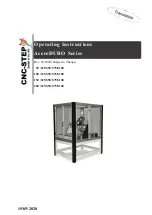
29-36
Cisco ME 3800X and 3600X Switch Software Configuration Guide
OL-23400-01
Chapter 29 Configuring IP Unicast Routing
Configuring EIGRP
To create an EIGRP routing process, you must enable EIGRP and associate networks. EIGRP sends
updates to the interfaces in the specified networks. If you do not specify an interface network, it is not
advertised in any EIGRP update.
Nonstop Forwarding Awareness
The EIGRP NSF Awareness feature is supported for IPv4 in the metro IP access image. When the
neighboring router is NSF-capable, the Layer 3 switch continues to forward packets from the
neighboring router during the interval between the primary Route Processor (RP) in a router failing and
the backup RP taking over, or while the primary RP is manually reloaded for a nondisruptive software
upgrade.
This feature cannot be disabled. For more information on this feature, see the EIGRP Nonstop
Forwarding (NSF) Awareness Feature Guide at this URL:
http://www.cisco.com/en/US/docs/ios/12_2t/12_2t15/feature/guide/ft_ensf.html
Configuring Basic EIGRP Parameters
Beginning in privileged EXEC mode, follow these steps to configure EIGRP. Configuring the routing
process is required; other steps are optional:
Command
Purpose
Step 1
configure terminal
Enter global configuration mode.
Step 2
router eigrp autonomous-system
Enable an EIGRP routing process, and enter router configuration
mode. The AS number identifies the routes to other EIGRP routers
and is used to tag routing information.
Step 3
network network-number
Associate networks with an EIGRP routing process. EIGRP sends
updates to the interfaces in the specified networks.
Step 4
eigrp log-neighbor-changes
(Optional) Enable logging of EIGRP neighbor changes to monitor
routing system stability.
Step 5
metric weights tos k1 k2 k3 k4 k5
(Optional) Adjust the EIGRP metric. Although the defaults have
been carefully set to provide excellent operation in most networks,
you can adjust them.
Caution
Setting metrics is complex and is not recommended
without guidance from an experienced network
designer.
Step 6
offset list [access-list number | name] {in | out}
offset [type number]
(Optional) Apply an offset list to routing metrics to increase
incoming and outgoing metrics to routes learned through EIGRP.
You can limit the offset list with an access list or an interface.
Step 7
no auto-summary
(Optional) Disable automatic summarization of subnet routes into
network-level routes.
Step 8
ip summary-address eigrp
autonomous-system-number address mask
(Optional) Configure a summary aggregate.
Step 9
end
Return to privileged EXEC mode.
















































